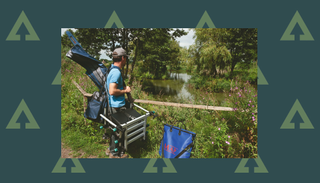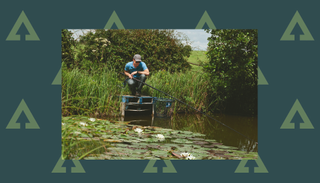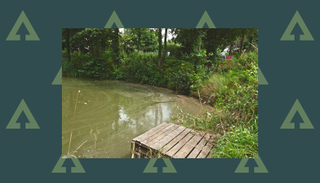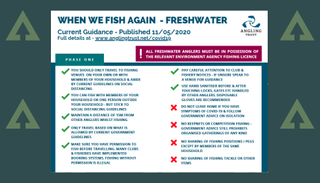How to pick the very best swim on a well-stocked fishery
Fish are not evenly spread at day ticket lakes. We'll help you catch more with this quick guide.

Welcome to Advnture, the new home of AnglersMail.co.uk
Commercial fisheries and very well stocked club lakes have been the go-to port of call for thousands of anglers as lockdown rules have been eased.
The rivers in England and Wales remain closed for coarse fishing until June 16.
The weather looks set fair, and more and more anglers will be thinking of having a session on a day ticket lake near them.
But how to your get an edge? What do you look for when you get unload your car and have look on commercial fisheries?
Regular sport is more of a guarantee on these densely-stocked carp-based stillwaters.
Do remember: as with any water, there will be some areas that are consistently more productive than others.
Advnture Newsletter
All the latest inspiration, tips and guides to help you plan your next Advnture!
Carp, no matter how big, are creatures of habit. They are drawn almost magnetically to particular features in their quest for a decent mouthful of tucker.
Where to start on commercial fisheries
Most day ticket and well-stocked club pools include a host of key fish-holding features.
Even the plain looking pools, sometimes called ‘puddles’, will have areas that contain concentrations of fish.
Try to familiarise yourself with the layout of the pool, discovering which areas yield the most bites.
An obvious starting point are the swims closest to the car park…. as you see below.

These short-walk spots receive the most bait, so will generally hold a good head of resident fish, though these fish can be particularly cautious.
A little rig fine-tuning is often the key to catching fish from car park pegs.
Car park or ‘lazy’ pegs hold resident fish because they receive the most bait.
Clever carp learn quickly what areas provide the most feed, and these pegs are a popular fish haunt.
Fine tune your presentation, though, as residents in popular pegs are no push-over.

Heading off to the distant sanctuary areas on busy days is also worth the trek, as the pool’s biggest residents can often be found in the quieter spots.
Here they can be tempted to feed confidently if approached with a little stealth and caution.
Lilies (pictured above), weed and rush beds are other notable fish magnets, offering a rich food larder.
Lilies are an obvious hotspot, as they harbour an abundance of natural aquatic food all year round, even when the pads have long since died back. They will feature heavily on patrol routes.
Present a bait smack on the edge of some lily pads and you’ll soon have a bend in your rod.

Islands are another obvious hotspot, and presenting baits as close as possible will certainly produce plenty of bites. Islands are an excellent all-year-round feature.
Casting a well-presented rig close to islands will produce bites all year round. Reed beds on island margins are particularly productive, and the denser the better.
This is where a pole comes in handy as you can place baits with pin-point precision every time. It can be a devastating and consistent method.

Keep an eye out for the scum-line, too (pictured above). It might not look very appealing to cast a bait to, but wind direction plays a pivotal role in fish movement, especially on larger venues.
Scum lines look pretty horrid, but in amongst that grime are an abundance of aquatic goodies – terrestrial morsels also end up in these wind-driven scum lines.
Some shrewd anglers rate these spots highly at dawn, and choose to fish them. You always seem to see plenty of bubbles, fizzes and bow waves amid the scum before other pool hotspot areas awaken.
Look for any corners on commercial fisheries where the wind is blowing in. These areas can hold surprising numbers of fish and shouldn’t be ignored, even if they do look unappealing.

Areas of thick aquatic weed or beds of dense reeds and rushes offer an abundance of food items and will feature heavily on a carp’s patrol route.
Keep an eye out for subtle colour differences and agitated water caused by grubbing fish.
Twitching reeds are another tell-tale sign of moving fish, and bites from alongside these key areas can be bold and confident, so get ready.

Bait spilled from fishing platforms and the darker water under the stagings are obvious fish magnets.
If the next platform is vacant, present a bait alongside it and you could be up for some hectic sport.
This is where great fun can be had with a stout margin pole – try lowering paste in gently. This seems to select the biggest of the ‘kerb crawlers’!
Stay safe, follow the very latest rules… and keep your social distance at all times. Angling Trust guidelines are below.
Sincere good luck on your next session!

Running from 1964 until 2020, Angler's Mail was the UK's leading weekly magazine devoted to coarse fishing, telling readers everything they needed to know about which fish to catch, where to catch them, and what kit they needed to do it. Now, loads of the magazine's expert advice can be found on Advnture.com, as a helpful resource for angling newcomers and experts alike.
Most Popular

